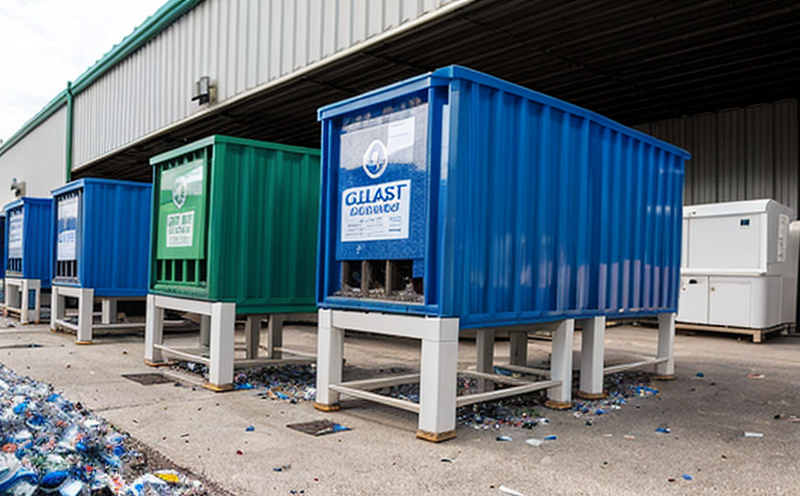EN 12879 Glass Waste Alkali Resistance
The EN standard 12879 specifies a method to determine the alkali resistance of glass waste materials intended for recycling. This test is crucial in ensuring that recycled glass can withstand the harsh conditions encountered during thermal treatment processes, such as those used in cement production or other industrial applications.
The primary objective of this test is to assess how well the glass waste resists dissolution by aqueous alkali solutions, which helps prevent contamination and ensures product quality. Understanding alkali resistance is essential for maintaining the integrity of recycled materials and meeting environmental standards. This knowledge also supports R&D efforts in optimizing glass recycling processes.
The standard applies to various types of glass waste that are suitable for recycling, including container glass, float glass, and technical glasses like those used in electronics or pharmaceuticals. By conducting this test, quality managers can ensure that the recycled materials meet the required specifications, thereby maintaining product consistency and reliability.
Alkali resistance is a critical factor in determining the suitability of waste glass for recycling into new products. The test involves subjecting samples to an alkali solution under controlled conditions over time to observe their dissolution rate. This process simulates the thermal treatment environment that recycled glass might encounter during its reprocessing.
The results from this test are used by compliance officers and R&D engineers to make informed decisions about waste management practices and recycling processes. It also aids in selecting suitable raw materials for new products, ensuring they meet environmental standards and industry expectations.
Understanding alkali resistance is particularly important when dealing with different types of glass waste, as each type may have varying levels of alkali resistance. This variability emphasizes the need for accurate testing to ensure that recycled materials are fit for purpose across various applications.
The test procedure outlined in EN 12879 provides a standardized approach to evaluating alkali resistance, which is essential for maintaining consistency and reliability in glass recycling processes. By adhering to this standard, laboratories can provide reliable data that supports informed decision-making within the industry.
Scope and Methodology
| Parameter | Description |
|---|---|
| Test Specimens | Waste glass samples intended for recycling. |
| Alkali Concentration | Aqueous solutions with specified alkali concentrations. |
| Temperature and Time | Standardized conditions to simulate thermal treatment environments. |
| Weighing and Measurement | Accurate measurement of weight loss or gain over time. |
The test involves subjecting the glass waste samples to an aqueous alkali solution at specified temperatures for a defined duration. The specimens are weighed before and after exposure to monitor any changes in mass due to dissolution. This allows for precise determination of the alkali resistance properties of the recycled glass.
Standardization ensures that results from different laboratories can be compared reliably, facilitating consistent quality control and compliance with international standards. Accurate measurement techniques are crucial for obtaining reliable data, which supports informed decision-making in waste management and recycling practices.
Why Choose This Test
- Ensures compliance with environmental regulations.
- Supports the development of sustainable recycling processes.
- Promotes the use of recycled materials in various industries.
- Aids in maintaining product quality and consistency.
- Facilitates the selection of suitable raw materials for new products.
- Provides reliable data that supports informed decision-making.
- Meets international standards and industry expectations.
The EN 12879 test is essential for ensuring that recycled glass waste meets the necessary quality criteria, thereby promoting sustainable practices within the industry. By choosing this test, laboratories can provide reliable data supporting informed decisions regarding waste management and recycling processes.
International Acceptance and Recognition
The EN 12879 standard has gained widespread acceptance across Europe and beyond due to its rigorous methodology and consistent results. Laboratories that adhere to this standard are recognized for their expertise in glass waste analysis, which can enhance credibility within the industry.
Many countries have adopted similar standards or use EN 12879 as a benchmark for their own regulations. This global recognition ensures that recycled glass products meet high-quality standards and can be trusted for various applications. Compliance with this standard also helps manufacturers comply with environmental policies, thereby contributing to sustainable development goals.
The international acceptance of the EN 12879 test underscores its importance in promoting responsible waste management practices and recycling initiatives globally. By aligning with these standards, laboratories play a crucial role in advancing sustainable manufacturing processes and reducing environmental impact.





